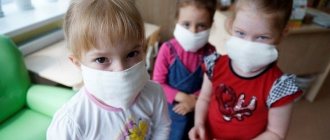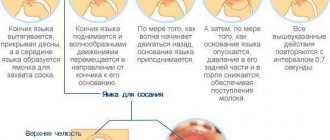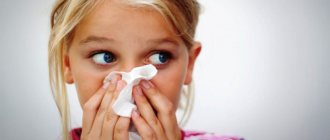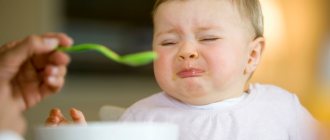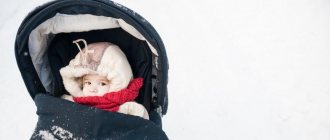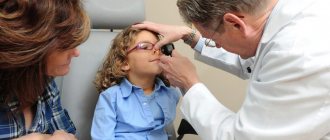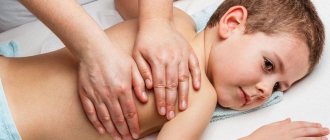May 29, 2019
Averyanova Sveta
If a child of any age develops a cough, the first thing parents should do is contact their pediatrician. However, the doctor cannot always examine the baby on the day of treatment. If a pediatrician’s visit is planned only in a few days, the question arises: is it possible to walk with the child if he has a cough during this period. The decision is made individually, based on the general well-being of the baby and a number of other factors.
Causes of cough in children
Before going out, you need to determine the cause of the unwanted symptom. If parents do not know why the child is coughing, they need to call a doctor. If the etiology of cough is known, it is important to follow the doctor’s recommendations and make decisions based on the situation.
Cough can be different: dry or wet, periodic or constant, painless or severe paroxysmal. It can accompany diseases of the respiratory tract and other organs (thyroid gland, heart, gastrointestinal tract, etc.). It is often a sign of the following diseases:
- ARI (acute respiratory diseases);
- bronchial asthma;
- ARVI (acute respiratory viral infections);
- inflammatory processes in the nasal passages or paranasal sinuses;
- bacterial infections (whooping cough, tuberculosis, etc.);
- laryngitis;
- tonsillitis (tonsillitis);
- inflammation of the tracheal mucosa;
- bronchitis;
- pneumonia;
- allergy;
- childhood viral diseases (measles, rubella, etc.).
Important! Sometimes a cough may be the only manifestation of a serious illness, such as pulmonary tuberculosis.
If you experience periodic coughing for no reason, you should consult a pediatric pulmonologist.
Young children may cough due to a foreign object in the airway. In such a situation, emergency medical attention is required.
Types of cough for which you can walk with your child
There are two types of cough: wet and dry. The first differs from the second in that it releases sputum accumulated in the respiratory tract. As for walking, you can walk even if you have a dry or wet cough. If you approach the issue correctly, then thanks to being in the fresh air, a dry cough will quickly turn into a productive one, and a wet cough will soon disappear altogether. The same principle applies to coughs caused by allergic reactions, but in this case you need to make sure that there is no irritant (pollen, fluff) outside the house and give the child an antihistamine in advance.
What kind of cough can you take for a walk?
If the child begins to cough and there are no other signs of illness, you can go outside. However, after a walk you should measure your body temperature, look at your throat, and ask your baby how he feels. If the cough gets worse, snot and signs of intoxication appear, you should refrain from walking. You should call a doctor or make an appointment at a clinic.
A severe, hysterical, frequent cough is also a reason to consult a doctor. In this case, even in the absence of other symptoms, you should not take your child outside. If the child is small, he can be taken out to the balcony in a stroller . For older children, the room should be well ventilated (in the heat of summer, you can open the window).
If we are talking about an acute period of the disease, bed rest is necessary. You can't go for a walk at this time. When the acute symptoms pass, the temperature and general condition of the baby return to normal, you can go outside for a short time to get some fresh air. With an adequate attitude towards walking, the final recovery will come faster.
If your child begins to cough when breathing in cold air, he or she may be allergic to the cold. Similar manifestations can be observed in spring and summer during the flowering of grasses. In such a situation, you need to cancel the promenade and consult a doctor.
An allergic cough is a reason to stay home.
You should not walk outside if the child is a source of infection for other people. When your baby coughs, viruses (bacteria) can spread over significant distances. Each infection has a clear time limit for contagiousness, which can be obtained from your doctor.
It is definitely allowed to go for a walk when coughing is a residual phenomenon after an illness, provided that there are no complications and the recovery process is proceeding normally. Outside of an exacerbation of chronic pathology, a cough also does not serve as a contraindication to going outside.
All the pros and cons
The effect of spending time in humid weather is equivalent to productive inhalation
What is a cough? This is a protective-adaptive reaction aimed at restoring and maintaining airway patency . Irritation of cough receptors occurs not only upon contact with fine dust, mucus or foreign objects, but also as a result of inflammation of the mucous membrane of the larynx, bronchi, and trachea.
Pathological cough is a common denominator for diseases of different etiologies . The main root causes of its occurrence are compared with acute respiratory viral infections, pharyngitis, sore throat, sinusitis, and laryngitis.
Disturbances in mucociliary clearance in childhood can be caused by abnormalities in the functioning of the cardiovascular system, gastrointestinal tract, liver and kidneys, localization of benign and malignant formations, and allergies.
Therefore, before deciding whether it is possible to walk with a child when he has a cough, it is necessary to consult an otolaryngologist, analyze the weather conditions and the general well-being of the baby .
Pathologies and conditions when it is preferable to refuse air baths are presented in the following list:
- The stage of pronounced manifestations, which lasts 2-3 days . These are arbitrary figures; they may change up or down depending on the treatment regimen. The period of exacerbation is characterized by an increase in painful symptoms and the emergence of new clinical forms.
- High body temperature, weakness, malaise, fever . The patient needs bed rest.
- Adverse weather conditions . In winter, this means a drop in temperature to -15⁰C and below (for sick children under one year old there is a reason to stay at home if the thermometer shows -5⁰C), gusty winds, snow and rain, and a blizzard. Sultry heat and high humidity have a detrimental effect on a weakened body.
- Residual cough . The last word remains with the attending physician. Taking into account the baby’s physiology and the characteristics of the disease, the pediatrician determines the frequency and duration of walks, especially when it comes to children under one year old.
In addition, destabilizing environmental factors include excessive concentrations of chemical elements in the atmosphere (typical of industrial areas), smog and heavy smoke during agricultural work.
Important! The incubation period after infection with viruses that cause ARVI lasts from 3 to 5 days. Pathogenic microorganisms are transmitted aerogenously, and in order not to infect strangers, it is necessary to avoid contact with healthy children.
If a child coughs more often and more intensely after a walk, this is a natural reaction that indicates a positive dynamics of recovery. Humid air reduces the stickiness of sputum, which makes it easier to expectorate, thereby activating the process of self-cleaning of the bronchial tract. During an attack, it is necessary to allow the baby to cough outside, since this will be problematic at home due to lack of oxygen.
It is harmful to go outside immediately after therapeutic procedures (inhalations, taking warm liquids, rubbing).
Benefits of fresh air for coughs
The simplest and most effective way to saturate a child’s body with oxygen is to spend more time in the fresh air . What if the child gets sick? Is it possible to walk outside if you have a cough?
A weakened immune system needs additional energy to resist viruses and bacteria, but where to get strength if the baby is constantly in a closed, unventilated room? Therefore, if the baby’s condition is satisfactory, take the child to the park or forest as soon as possible .
For respiratory diseases, sea air is very useful. It contains a record amount of ozone and oxygen, so there is no room left for viruses and bacteria
The benefits of air baths are manifested in the following actions:
- normalization of immune status;
- improvement of transport functions of the mucociliary apparatus;
- increased blood circulation in the bronchi;
- increasing the productivity of secretory glands;
- migration of a dry cough into a wet one;
- strengthening the bronchopulmonary apparatus.
When getting your baby ready for the promenade, you should take into account the fact that attacks of allergic cough worsen on the street during the flowering of trees, flowers, and gusts of strong wind.
When the respiratory organs are filled with oxygen, the lumens in the bronchi actively expand, the quality of breathing is restored, which shortens the recovery time and minimizes the risk of relapse of the disease.
Fact! In accordance with the sanitary and hygienic standards of children's institutions, walks with children under 4 years of age are prohibited at temperatures of -15⁰С and wind speeds above 15 m/s, starting from the age of four at -20⁰С.
What are the benefits of walking?
Walking will be beneficial provided that the air is really fresh, clean and humid. Therefore, you should take a promenade in environmentally friendly, gas-free places. If there is an opportunity to take your child outside the city, it is better to take advantage of it.
The pine aroma is especially beneficial for the respiratory system. The needles contain phytoncides that destroy pathogens, improve local immunity and relieve inflammation in the lung tissue. Walking slowly through the forest and taking a deep breath of fresh air is an effective cure for respiratory diseases.
Walking along the sea coast, along deciduous plantings, etc. will also have a beneficial effect on the organs of the respiratory tract and the body as a whole. Oxygen entering the lungs nourishes all tissues and cells, improving the functioning of the immune system structures.
In the city you should walk in public gardens, parks and special recreation areas.
Being near highways, industrial buildings and other “harmful objects” of megacities will negatively affect health.
If a child’s cough gets worse outside, there is no need to panic and immediately run home. We need to watch the baby and figure out what’s wrong. If the cough is normal, not paroxysmal, and does not cause pain or other negative reactions, then there is no need to worry. This is a normal reaction of the bronchial mucosa to inhaling cool, moist fresh air. Their lumen expands, the mucus becomes less viscous and is easily evacuated out.
Pediatrician Komarovsky explains to parents in his programs and books that the best cure for many pathologies, including those accompanied by a cough, is fresh air. Therefore, taking a walk with your child outside of the acute period of illness is always useful. When outside, the children's room should be well ventilated. You can additionally carry out quartzing and wet cleaning.
An important factor for a speedy recovery is the normal microclimate in the room where the child is. The baby should breathe fresh cool air not only outside, but also at home. To do this, it is recommended to ventilate the room every 2 hours. It is better not to use objects and things that accumulate dust and dirt (carpets, large soft toys, etc.) where children are located.
The harm of walking when you have a cough
Actually, walks in satisfactory condition cannot do any harm, but they should be abandoned if the child has a fever or is not feeling well. In all other situations, a walk will not cause harm. Usually you need to stay at home during the most acute period, the first two or three days, when the temperature persists, there is no appetite and weakness is expressed. After the temperature has dropped, walks are needed every day, even if the cough and snot have still not gone away. You should not stay at home just because of nasal congestion, nasal discharge or cough. Contraindications for walking are:
- Fever above 38 degrees accompanied by chills, sweating, goosebumps;
- Malaise, weakness, shortness of breath, difficulty breathing;
- Headache, sleep disturbances and poor appetite;
- Severe lethargy or moodiness, overexcitement due to illness, refusal to go outside;
- Cough provoked by purulent sore throat, obstructive complicated bronchitis, pneumonia, when strict adherence to bed rest is required until the condition improves.
In case of other pathologies, against the background of a relatively satisfactory condition of the child, it is important to pay attention to the weather and its features when deciding whether to take a walk with a sick baby. So, it is advisable to refuse it if there is extreme heat or frost outside, rain or strong wind, storm, snowfall.
When walking is bad
If parents are unsure whether to go outside with their child or not, it is better to consult a doctor. You cannot walk during an acute period of illness.
You should refrain from walking if your cough is accompanied by the following symptoms:
- increased body temperature over 38°C, fever;
- chills (shivering caused by spasm of superficial blood vessels);
- severe malaise, fatigue, drowsiness;
- pathological excitement, nervousness;
- refusal to eat;
- sore throat, head, or chest;
- the presence of pus or streaks of blood in the sputum;
- severe runny nose (cannot breathe through the nose).
If the baby has pneumonia, purulent tonsillitis, complicated bronchitis, laryngitis or other serious pathology, going outside is strictly prohibited. After serious illnesses, during the recovery period, walks should be treated with special caution. A weakened child's body can easily catch a new infection.
Your child should not be allowed to play outdoor games that involve running or intense movements. The baby may sweat, which will worsen the course of the disease. It's better to walk slowly or play quietly. Also, you should not allow your child to sit on cold ground, metal or concrete structures.
Temperature regimes, weather conditions
Walks are possible in weather conditions familiar to the child, be it frosty or hot weather, typical for the region. You can walk in the cold, if it is normal for the area and time of year, it is important that there is no strong wind or precipitation. If a cough occurs in a baby up to one year old, it is recommended to be outside until minus 10 degrees; if the temperature is lower, it is worth replacing a walk with sleep on the balcony.
A walk in fog or light rain is useful, it moisturizes the mucous membranes, and inhaling cold, moist air relieves coughing. It is only important to dress the child according to the weather so that he does not freeze or get wet (especially his feet).
In the summer, at high temperatures and low humidity, you should stay at home, if you have the opportunity to take a walk in a forested area or near a pond - this is the best option, there the air is cooler, more humid, which is more useful for coughing.
Important
You should avoid walking if there is heavy smoke or if there is dust, smog, or unpleasant odors in the air.
Duration of walks and weather conditions
The duration of a walk for a coughing child will depend on:
- doctor's recommendations;
- period of illness;
- baby's age;
- weather conditions.
If the acute period has passed, but the disease has not completely receded, you need to start walking for a few minutes (up to 15–20) , gradually increasing the walking time (maximum 1.5 hours). Clothes are selected according to the season. Don't wrap your baby too tightly.
You should dress the same as before you got sick.
Important! You cannot cover your nose and mouth with a scarf. Parents are trying to protect their child from the cold in this way, but the effect will be the opposite. The fabric will become wet from condensation and begin to cool more. A humid environment will promote the proliferation of microorganisms.
Before going outside, pediatricians recommend clearing your nose well so that nasal breathing is free. It is forbidden to let the child go outside immediately after medical procedures (massage, inhalation, etc.). You need to wait at least half an hour, preferably a couple of hours.
You need to stay at home if you are outside:
- frost below -10°C;
- cold and windy;
- stormy gusty wind at any thermometer reading;
- heavy rain or snowstorm;
- increased gas pollution, air pollution.
Particular care should be taken with infants. Their thermoregulation system is not formed, so they easily become hypothermic and overheated. For infants, the tips are as follows:
- in the winter season, it is not recommended to walk when the air temperature is below -5 degrees (in unfavorable weather conditions, the stroller with the baby can be taken to the balcony for 10–15 minutes);
- in summer it is better to leave the house early in the morning or in the evening, so that hot dry air does not irritate the respiratory tract; clothing should be natural and light;
- in spring and autumn, when viruses are most active, you should not walk where there are a lot of people (playgrounds, amusement parks, etc.).
- If the mother suspects that the baby is coughing due to the presence of allergens in the air, there is no need to walk where they are.
If cough is a symptom of bronchial asthma, parents should strictly follow the doctor's recommendations. At any moment during a walk, the child may become ill. In this case, medications that relieve bronchospasm should always be on hand.
It is advisable to take with you on a walk:
- disposable handkerchiefs;
- warm water (milk) for drinking;
- a pacifier for the baby so that he breathes through his nose and not his mouth;
- cough tablets or lozenges;
- drops or spray against nasal congestion.
Depending on the situation, you can take additional clothing (a warm jacket in spring, a raincoat in cloudy weather, a scarf in winter, etc.). If a child goes for a walk in a car, he will need replacement clothes, since the baby may sweat in the car.
For what type of cough is walking allowed?
Before going outside with your baby, it is important to take into account the weather conditions and the condition of the little person.
Each infectious disease occurs in two periods. In the acute phase, when fever, weakness and other signs of intoxication progress, the child is strictly prohibited from walking. At such times, strict bed rest is observed with mandatory ventilation of the room. The immune system in the acute phase is weakened, and the baby’s body is easily vulnerable to external influences.
For ARVI with a body temperature not higher than 38 °C and normal general condition, pediatricians say that you can take the child out into the fresh air for 10–15 minutes. In this case, the baby should be warmly dressed in cold weather and hidden from the wind.
During a dry cough, a cool atmosphere reduces the viscosity of secretions and improves coughing. Fresh, oxygen-enriched air helps to relax the bronchi and increase their lumen. And if you have a wet cough, you can go for a walk - the sputum is separated much more easily on the street.
If you have a runny nose and reddened tonsils, you can also go into fresh air. This moisturizes the mucous membrane of the respiratory tract and makes it easier to breathe. Discharge quickly comes out of the nose. Don’t let this fact scare parents - this is a natural cleansing of the passages and sinuses from infectious agents.
Systematic walks in the air when coughing protect the child from stagnation of sputum. They warn against complications (for example, inflammation of the middle ear). For whooping cough and obstructive bronchitis, going outside, where the atmosphere is enriched with oxygen, is an effective method of therapy.
In case of severe infection and unfavorable weather conditions (rain, sleet or severe frost), you need to regularly ventilate the room where the baby sleeps and plays, instead of going outside.
Rules for walking
Every mother wishes only the best for the baby and takes care of the baby’s health with close attention.
To ensure that going out into the fresh air when you cough brings only benefits, it is important to follow the recommendations for walking:
- How to treat a dry cough in an adult that lasts for a long time without fever
- do not leave the house during intense wind, rain and atmospheric temperature less than -5 °C;
- It is also unfavorable to walk in extreme heat, when the oxygen content in the air is reduced and there is a risk of heat stroke;
- choose a place for hiking when you have a cough as far away from main roads as possible; a coniferous park, garden or public garden is suitable;
- You should not over-wrap your baby, this will lead to increased sweating and the blowing wind will cause extremely undesirable consequences;
- in winter it is necessary to dress the child as warmly as possible, but lightly, tightly cover the neck, insulate the legs and arms;
- in the summer, cover all parts of the baby’s body from the sun, but you should avoid overheating and not walk between nine in the morning and three in the afternoon;
- You can be outside for an average of 1.5 hours; if the cough gets worse, you need to go back home.
After returning home, parents should monitor changes in the child's condition. If the baby feels better, you can go outside again tomorrow.
Why does a child cough on the street?
Parents are often interested in the question: why does their child cough on the street, but not at home? There may be several reasons. The first of them: the street air is cool and humid, so you will cough up phlegm better than indoors. This reaction of the body is considered natural.
The second reason is active walks. If the baby runs and jumps, breathing will become more intense during movement. After a run, the phlegm will begin to clear better. However, forced breathing through the mouth can cause undesirable consequences and aggravate the course of the disease.
Important! Sometimes, immediately after an illness, children want to run around, take part in games, or climb the horizontal bars. It is difficult for restless people to stay in one place. The task of parents is to limit their child’s excessive activity until the cough and other symptoms completely disappear.
Another reason why a baby coughs outside is an allergy. It needs to be diagnosed and treated. An allergic reaction is possible to grass blooms, cold or other irritants.
Sometimes a child may simply inhale exhaust fumes or fumes. The lungs will rush to clear themselves of strong pungent odors by coughing. Therefore, you should not walk near the roadway or in places where atmospheric parameters are far from normal.
The benefits of walking in sick children
Naturally, any walk enriches the blood with oxygen, helps activate the immune system to more actively suppress the proliferation of viruses or bacteria, and helps drain the bronchi. There is evidence that constantly staying at home, indoors, lengthens the healing process.
With a dry cough, the air outside is cool and more humid than in the house, helping to cough up and thin the mucus. If it is a wet cough, the bronchial receptors are irritated in the air, and the sputum is released more easily and quickly. Against the background of a runny nose or dry, red throat, you can walk; this moisturizes the mucous membrane, reducing its irritation. The volume of mucus secreted during a cold increases on the street, which means that a dry and hacking cough is softened. This helps alleviate the condition, speed up the transition from a dry cough to a wet one, normalizes drainage from the sinuses and speeds up the healing process.
Important
Daily walks are a means of preventing congestive complications of ARVI, helping to drain sputum from the nasopharynx and bronchi, as well as cleansing them of viruses or microbes. Walking is most important against the background of obstructive bronchitis, asthma or whooping cough. They help improve the condition, increase the tone of the bronchi, and remove accumulations of viscous sputum.
If a child feels unwell and cannot go outside, or bad weather does not allow walking, it is important to ventilate the rooms. Fresh air cleanses the room of bacteria and viruses, lowers the temperature and humidifies the air, tones and improves the mood of children.

